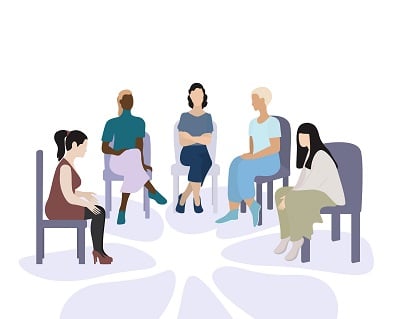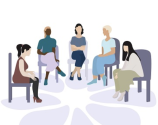Understanding Group Therapy and Support Groups
Understanding Group Therapy and Support Groups

Group therapy and support groups can play a very important role in one’s mental health treatment and considering current demand for therapy, they might be easier to access if finding an individual therapist is proving difficult. While Covid put a strain on the mental health field, Marla Deibler, PsyD, ABPP, says the silver lining has been that the pandemic helped widen access to care with increased telehealth services and clinicians being more able to practice across state lines. Deibler is the founder and executive director of The Center for Emotional Health of Greater Philadelphia, and she spoke with ADAA about the benefits and obstacles of groups and how to find the right one for you. Here are some questions we asked and what she had to say:
Support Group or Therapy Group – Which One Should I Choose?
They serve different functions, so it depends on what you are looking for. It’s important to remember that support groups aren’t treatment, but they can enhance treatment and help individuals feel less alone. They can decrease stigma associated with mental healthcare or with the issues you experience.
Support groups can be peer-led, in other words the facilitator shares a common experience with the group members, or they can be clinician-led. They are often at little to no cost, and provide a shared experience, a sense of belonging, and a safe place to discuss the difficulties and triumphs the members are experiencing. Typically, support groups are process-oriented, free-flowing sessions, especially if they are peer-led. If clinician-led, the conversation might be gently facilitated or structured in a specific way and there may be opportunities to ask the clinician some questions and gain some education from a psychological perspective around particular struggles. But the main purpose is to gain support and have that sense of shared experience.
Group therapy is a specific type of mental health treatment that brings together people with similar conditions under the guidance of a licensed mental health care provider. Like a support group, it can be process-oriented in that there is a guided discussion of members’ experiences, or it can be skills-based or structured in a format that is consistent with a specific treatment protocol for a presenting problem that the members all experience and work on together. Usually there is a cost to participate in group therapy, but it can often be covered by insurance and is typically less expensive than individual or family therapy.
|
Five Advantages to Groups |
Five Disadvantages to Groups |
|
More affordable and sometimes free |
Harder to guard confidentiality |
|
Enhance individual therapy |
A set group schedule may cause individual conflicts |
|
Increase access to care/bridge gaps on wait lists |
People not comfortable accessing care in groups |
|
Serve as a means of social support |
May not target exact issue or treatment protocol |
|
Provide a shared experience, feel less isolated |
For in-person only, transport might be problematic |
How Do I Find a Group?
Finding a group can be challenging. Not all providers advertise group services to the extent they do individual services. Consider starting by searching a provider directory through an advocacy organization, like ADAA or the International OCD Foundation (IOCDF) or a professional group like the Association for Behavioral and Cognitive Therapies, the American Board of Professional Psychology, or the American Psychological Association. Local community mental health advocacy organizations, especially those that are affiliates of larger organizations, such as affiliates of IOCDF or the Tourette Association of America, can also be useful resources. If you don’t see what you are looking for on these websites, call or email them because staff members are often very knowledgeable about area resources.
While some websites list specific information about groups or programs offered, others simply list providers. Take time to explore provider websites, send email inquiries, or call provider offices to ask about available group services. It would be great to see more large national databases of group services or group listings on advocacy sites. (Psychology Today’s national support groups is a good one.)
What Should I Ask or Look for in Any Group?
Consider your goal; for example, are you looking to share experiences and gain support or to engage in a specific treatment targeted at a specific difficulty? Ask about the schedule. Therapy and support groups can be ongoing, with members coming and going at various points during the schedule of sessions or they can have a specific time commitment, for example, committing to 10 weeks of weekly group therapy sessions, each with a specific agenda and prescribed set of work between sessions. Make sure you are comfortable in the group setting in which you may be sharing your experiences and working on developing skills with one another.
Consider whether in-person groups or telehealth groups would be preferable. Some people prefer in-person meetings; they feel more connected, more focused. Others prefer telehealth groups for their convenience and accessibility. Throughout the Covid pandemic, we have seen increased access to care with growth of telehealth services and legislative changes enabling interjurisdictional practice, so groups may be more accessible from a wider geographical area and set of individual circumstances. Ask yourself what is a better fit for you.
When considering a group, ask the facilitator or organizers about the format, work that will be done in and out of sessions and what is expected of you and the others in the group. Ask about the therapist’s experience with a particular condition or struggle and with delivering a specific kind of treatment. Think about whether you are looking for help with a specific problem and what the evidence-based treatment is for that problem. Information like that is readily available, on ADAA’s website for example. Become familiar with the kind of treatment you are looking for and find out if that group provides something consistent with what you seek in a group setting.
Conclusion
Across mental healthcare right now, there is an increased demand for services and not enough resources to meet those needs; group therapy is a means by which our mental health system may provide care to people in a timelier manner. And, both group therapy and support groups can bridge the gap to treatment, if you are on a waiting list or looking for an individual provider. At our practice, we are currently running seven groups and if someone wants to join a group, there is little to no wait, but there is currently a waitlist for individual therapy, even though we try to see people as efficiently as possible. Of course, there are always potential advantages and disadvantages to consider in seeking group-based services. Just remember that there are resources out there. You don’t have to feel alone.




















